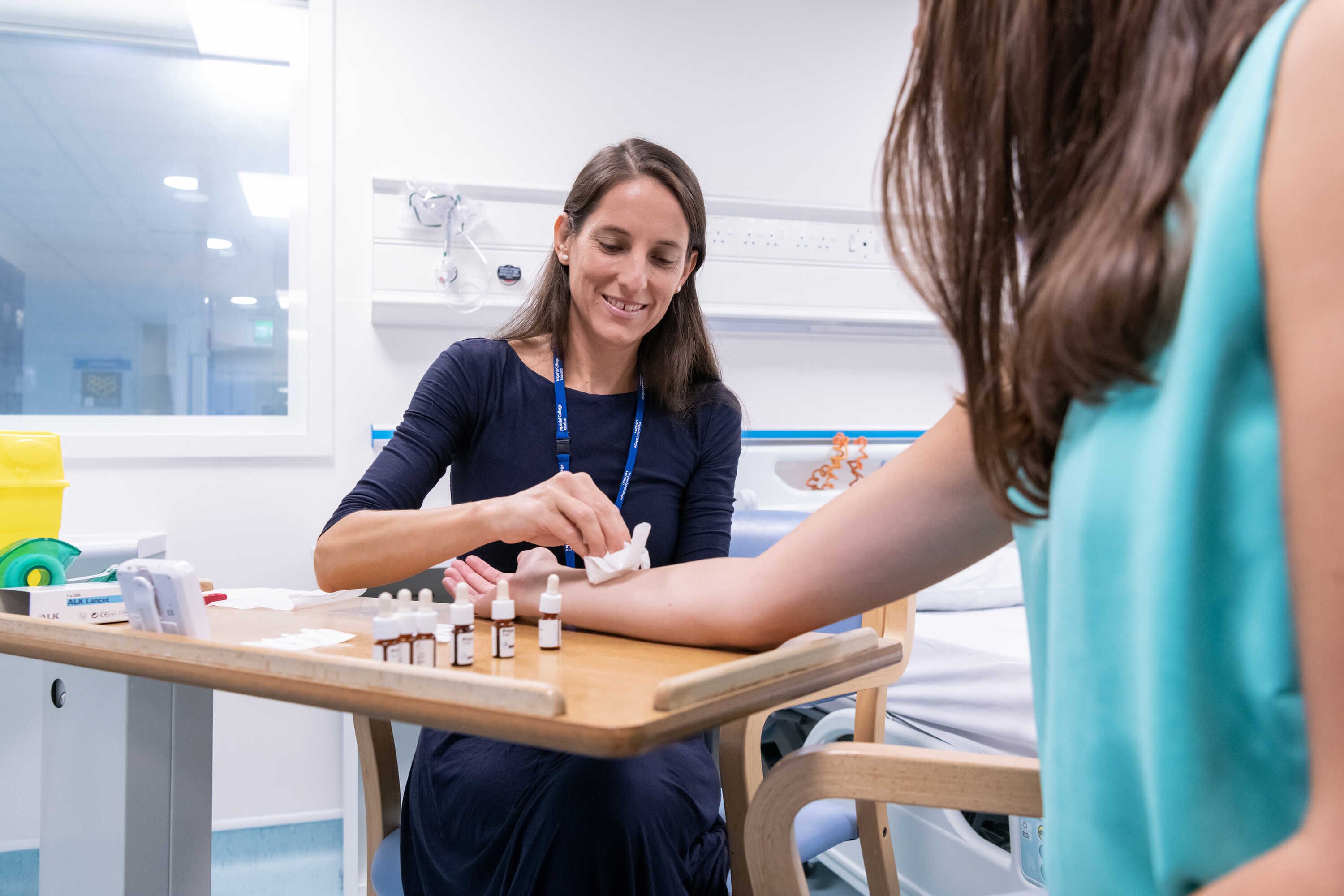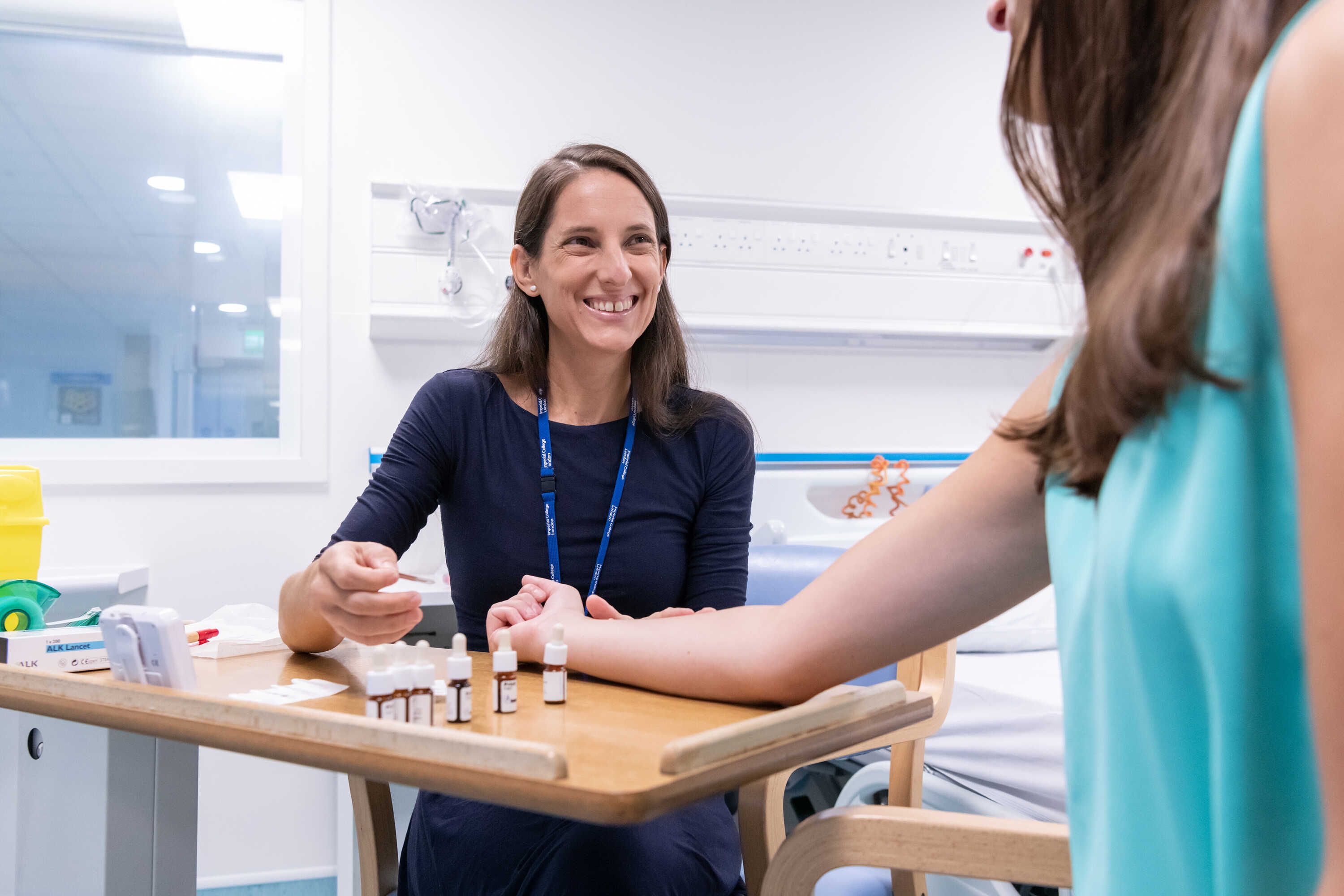
Allergy
Develop the advanced knowledge and practical skills to optimally diagnose and manage allergic diseases.
Develop the advanced knowledge and practical skills to optimally diagnose and manage allergic diseases and asthma
Explore the cutting-edge research that influences clinical practice and the latest innovations in diagnosis and treatment
Benefit from flexible or online learning options and fit your studies around your professional commitments
Course key facts
Qualification
MSc
Duration
2 years, 3 years
Start date
September 2025
Study mode
Part-time
-
Fees
Home
£15,500Overseas
£25,600 Online
£45,000 Blended
Delivered by
Location
-
Online
-
Royal Brompton
-
South Kensington
-
St Mary's
-
Minimum entry standard
2:1 in a medicine and healthcare related subject such as nursing, dietetics, immunology, physiology or biomedical science
Course overview
Advance your understanding of how to optimally diagnose and manage allergic diseases and asthma on this part-time Master's course.
Allergies are an increasing global health problem and there is an urgent need in the UK and worldwide for clinical allergy specialists. This course is designed to help healthcare professionals progress their knowledge towards specialising in areas of medicine such as allergy, paediatrics, respiratory medicine.
You'll explore everything from the basic immune mechanisms underlying allergic diseases and asthma, to the cutting-edge research that influences clinical practice.
Guided by world-renowned experts you'll develop your practical skills and better understand best practice in assessing, diagnosing and managing patients with allergic diseases and asthma in view of available evidence.
A research project forms the major component of this course.
You'll apply research methodology and data analysis techniques to an original research project or systematic review exploring an area of allergy medicine.
This Master's course is delivered either fully online or via a blended format (online and campus-based), providing you with the flexibility to fit studies around your professional commitments.
Get an introduction to MSc Allergy from the course director, and hear the experiences of our students
Structure
This page is updated regularly to reflect the latest version of the curriculum. However, this information is subject to change.
Find out more about potential course changes.
Please note: it may not always be possible to take specific combinations of modules due to timetabling conflicts. For confirmation, please check with the relevant department.
You'll study the following core modules, either fully online or delivered in a blended format.
Core modules
Explore the scientific basis of allergy, including the mechanisms underpinning allergic disease and asthma, and how this relates to the latest preventative, diagnostic and therapeutic strategies.
Develop your understanding of the clinical features seen in allergic diseases, and enhance your skills to optimally diagnose and manage them.
Examine recent research advances in the prevention, diagnosis and treatment of allergic diseases and how this can be applied in clinical practice. Develop research skills to design your own projects.
Assess the epidemiology, mechanisms, clinical presentation and advanced diagnostic and management strategies for a wide range of manifestations of food hypersensitivity.
Review recent advances across the developmental spectrum of allergic airways diseases in children and adults, and how to best manage them.
Understand the mechanisms, clinical presentation and advanced diagnostic and management strategies for allergic rhinitis and rhinosinusitis in adults and children, including allergen-specific immunotherapy.
Analyse a wide range of allergic skin diseases, including atopic eczema, contact dermatitis and urticarias, as well as drug hypersensitivity reactions.
Advance your knowledge of allergic diseases in childhood, from the mechanisms underlying complex multisystem disease to difficult clinical scenarios.
Develop the knowledge and skills required to conduct your own original research project or systematic review under supervision.
You'll apply a range of research methods used in allergy medicine and build your appreciation of the importance of research for the development and evaluation of clinical practice.
Your work will be assessed by a thesis and viva (oral examination).
Teaching and assessment
Teaching and learning methods
-
Virtual learning environment
-
Flipped classroom
-
Lectures
-
Tutorials
-
Group work
-
Workshops and practical sessions
-
Scenario-based settings and role play
-
Student-led activities
Assessment methods
-
Tutor and peer feedback
-
Group work
-
Student-led presentations and case-based sessions
-
Quizzes
-
Diagram completion exercises
-
Mock examinations
-
Computer-based examinations
-
Poster presentations
-
Presentations
-
Individual work
-
Reports, journal reviews and leaflets
-
Thesis
-
Oral assessment
Key people
Entry requirements
We consider all applicants on an individual basis, welcoming students from all over the world.
2:1 in a healthcare-related subject, medicine, nursing, dietetics, immunology, physiology or biomedical science.
How to apply
Apply online
You can submit one application form per year of entry. You can choose up to two courses.
The Allergy programme consists of three award stages, the MSc being the highest:
- PG Cert
- PG Dip
- MSc
You can enter the programme at any level and all courses are offered in either a fully online or blended format.
Please apply for the award with which you intend to exit. The PG Cert component is completed in the first year, PG Dip in the second year and the MSc in the final year.
After successfully completing an award, you can switch to the other mode of delivery. For example, from the online to the blended programme.
Read more about Postgraduate Certificate, Diploma and MSc degrees
Find out more about how to apply for a Master's course, including references and personal statements.
An ATAS certificate is not required for students applying for this course.
Fees and funding
Blended and Online formats - Home
MSc
£15,500 total fee
Top-up fee – £3,100 from the PG Dip
PG Dip
£12,400total fee
Top-up fee – £4,650 from the PG Cert
PG Cert
£7,750
If you have already completed one of the qualifications and are moving on to the next level of study, you will only need to pay the top-up fee for the course you’re applying for.
If you complete a qualification and continue to the next higher degree, you will pay the relevant top-up fee for the year of the new programme.
Please note, after successfully completing an award, you can switch to the other mode of delivery e.g. from online to blended.
You will pay the top-up fee for the mode of delivery you switch to. For example, if you switch from the PG Cert (online) to the PG Dip (blended), you will pay the top up fee for the PG Dip (blended).
You should expect and budget for your fees to increase each year.
Your fee is based on the year you enter the university, not your year of study. This means that if you repeat a year or resume your studies after an interruption, your fees will only increase by the amount linked to inflation.
Find out more about our tuition fees payment terms, including how inflationary increases are applied to your tuition fees in subsequent years of study.
Whether you pay the Home or Overseas fee depends on your fee status. This is assessed based on UK Government legislation and includes things like where you live and your nationality or residency status. Find out how we assess your fee status.
If you're a UK national, or EU national with settled or pre-settled status under the EU Settlement Scheme, you may be able to apply for a Postgraduate Master’s Loan from the UK government, if you meet certain criteria.
For courses starting on or after 1 August 2024, the maximum amount is £12,471.
The loan is not means-tested and you can choose whether to put it towards your tuition fees or living costs.
If you live in a country that imposes a GST for online courses, you may incur an additional tax charge on your tuition fees.
Currently, the countries that charge a GST are:
- Singapore
Find out more how to pay GST and how much it is.
Scholarships
Allergy scholarship
Value per award
- £2,000 to £3,000
Who it's for
- All students who make an application to the PG Certificate in Allergy.
The Dean’s Master’s Scholarships
Value per award
- £10,000
Who it's for
- All students applying to study a Faculty of Medicine Master’s course
The Dr Jean Alero Thomas Scholarships
Value per award
- Partial or full tuition fee at the Home rate
Who it's for
- All students applying to study a Faculty of Medicine lab-based Master’s course
How will studying at Imperial help my career?
Develop expertise in the area of allergies.
Become more familiar with the evidence base that supports allergy and asthma research and clinical practice.
Pursue roles in secondary and tertiary care in areas of medicine such as allergy, paediatrics, respiratory medicine, dermatology and gastroenterology.
Testimonials
Further links
Contact the department
Email: allergypgs@imperial.ac.uk
Course Director: Dr Marta Vazquez-Ortiz
Visit the National Heart and Lung Institute website.

Register your interest
Stay up to date on news, events, scholarship opportunities and information related to this course.

Events, tasters and talks
Meet us and find out more about studying at Imperial.

Meet our students
We asked some of our Master's students about their individual journeys.
Meet our Allergy students.
.jpg)
Terms and conditions
There are some important pieces of information you should be aware of when applying to Imperial. These include key information about your tuition fees, funding, visas, accommodation and more.
You can find further information about your course, including degree classifications, regulations, progression and awards in the programme specification for your course.
Programme specifications